This is my first post (after my introductory post). I had a bit of luck with a question that seemed to generate some interest on, and hopefully this one will get some good responses as well.... I am interested in hearing about what life was like for our boys when they returned home. Specifically, the boys in Europe. (BoB if possible, but really, anywhere in Europe would do). I wanted to know if it was like we see in the movies with big ships docking and floods of people waving and cheering and parties in the streets etc, or if it was more of a quiet affair. Did these boys have loved ones waiting on them the second they set foot on home soil or did they find their way home for surprise homecomings? If it was a big party, what was life like once the party was over? I know they were left to look for jobs and the GI bill came into effect which helped, but what was a typical day post WWII like? Mentally, was it difficult to adjust from war to quiet home life or was it easy because war was over? Details and stories if possible!
Depends when you came home and on what ships, whether it was a large affair or not. When the 82nd as a division came home after Berlin occupation, they marched in a parade. Many high-pointers of the 82nd (most made 3 combat jumps) came home in the summer of 45, recieved little reception. Most of them adjusted to normal life, many married their girlfriends from before the war. They became the postmen at your mailbox, the local bricklayer, architects, heck one trooper became an aerospace engineer!
There were the few that were effected badly and unfortunately became heavy drinkers and died at young ages. Some took their own life, but it is far fewer than today's soldiers. I know of one unfortunate trooper that was an original member of the 82nd, made it through the entire war, and passed in very late 46 of cancer I believe. Very sad to make it through all that (MUCH more than E/506), and die at such a young age.
Regarding BoB, read this; http://101airborneww2.com/bandofbrothers.html
It is very useful in determining fact from Hollywood fiction.
Welcome to the forum!
Oh interesting... thanks for the quick response. I just ordered the first DVD from the library of Band of Brothers and its supposed to be in soon (tomorrow, actually). I have been dying to watch it and its off HBO where I am so fortunately our awesome library had a copy of the series. I think my grandad was one of the unfortunate ones who came home, wife died VERY young in 1949 age 25 to cancer and he ended up a pretty heavy alcoholic. I have just been wondering about what life was like returning home after BoB... can only imagine. Now it seems "they" have fairly sophistocated programs for soldiers coming home to adjust to normal life and cope with PTSD, but back then? Was anything available like this? I know of some vets who dont speak of what they saw and experienced almost 70 years after the fact. They were made of tough stuff this I know.
I am unaware of specific programs (does not mean they did not exist), but you must remember people were much more reliant on EACH-OTHER rather than some kind of government/ third party program back then; community was a much larger part of the picture. There were many reunions after the war where they would talk though their experiences with the ones they went through it with, even companies had their own 'mini' reunions starting in 46. The 82nd's association actually started right after the Battle of the Bulge before the war even ended. Perhaps some of the WWII vets on the forum can chip in?
On the last disc, it says what they did after the war. Normal things. If you approach a vet the right way, they will talk about anything. Trust me. Most mistakes people make in trying to get them to talk about it is this: they (the vet) DOESN'T want to have an informal conversation about it. Sit them down, get the pen and paper out, and have a long conversation giving them your undivided attention and have true interest in what happened. It has worked for me and my buddy.
Interesting topic and actually some of the vets who joined this forum have talked about it.
Most came home to a quiet welcome, where it was mostly family and friends and local communities.
Many of the "boys" didn't come home with their entire units; many dribbled in a some didn't even return with their units. That would be strange, wouldn't it. It all depended on the points system.
My father didn't arrive home until November 1945.
Oh BTW, I moved this topic to the WWII section from the Shooting the Breeze, which is for off-topic general subjects not related to the war. Anything posted in that section only stays there for 30 days too, so it would have been long gone in a few weeks.

My grandfather came back by himself realtively sooning after the war. He ended up flying back in a bomber (which was still risky considering who many bombers were lost even when no shots were being fired) and just went home. He was a civil engineer before the war so his post war activities were in synch with what he did during the war - at least in a general sense. I doubt he had much bridge rebuiding to do as he had during the war. Pontoon bridges probably weren't en vogue in the US in 1946 so much either! Here is his journal for the way home:
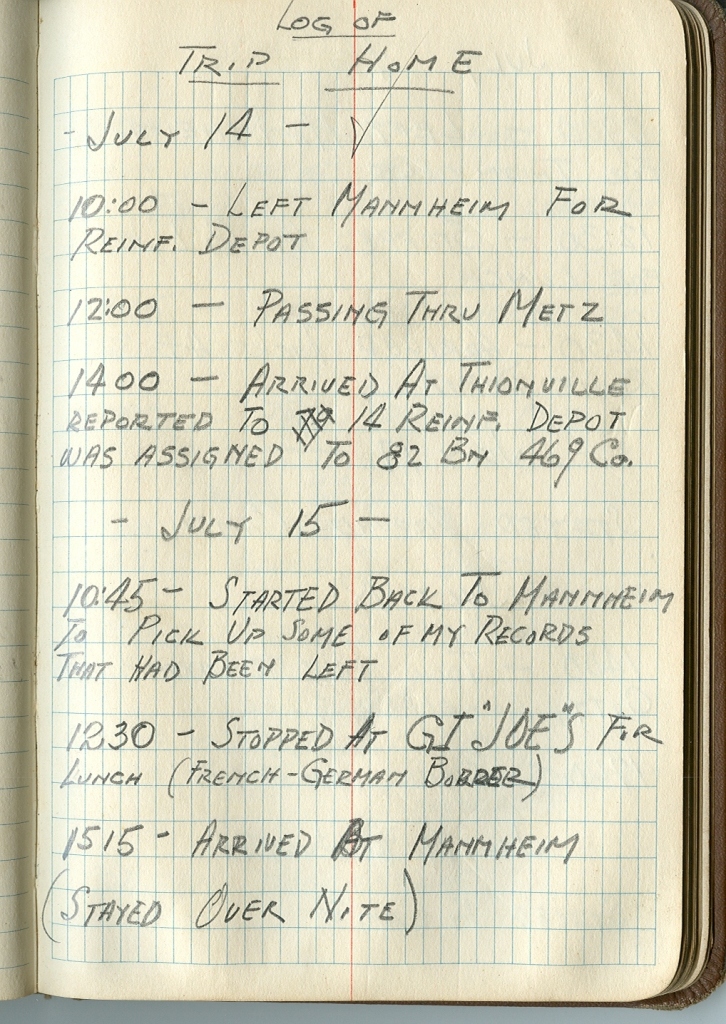
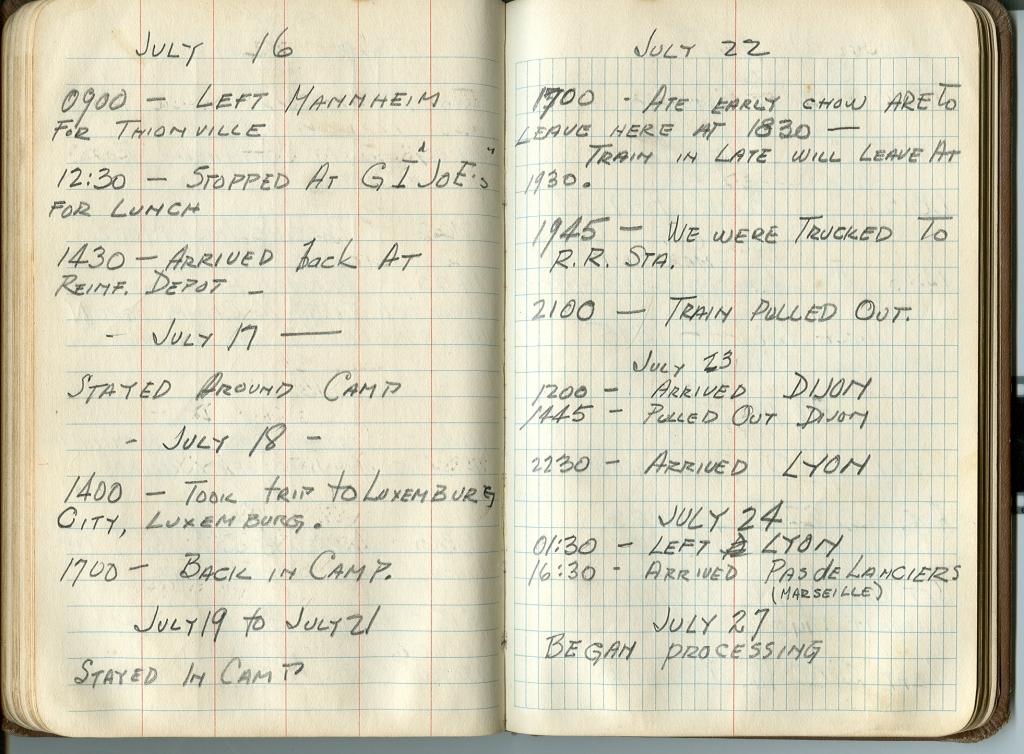
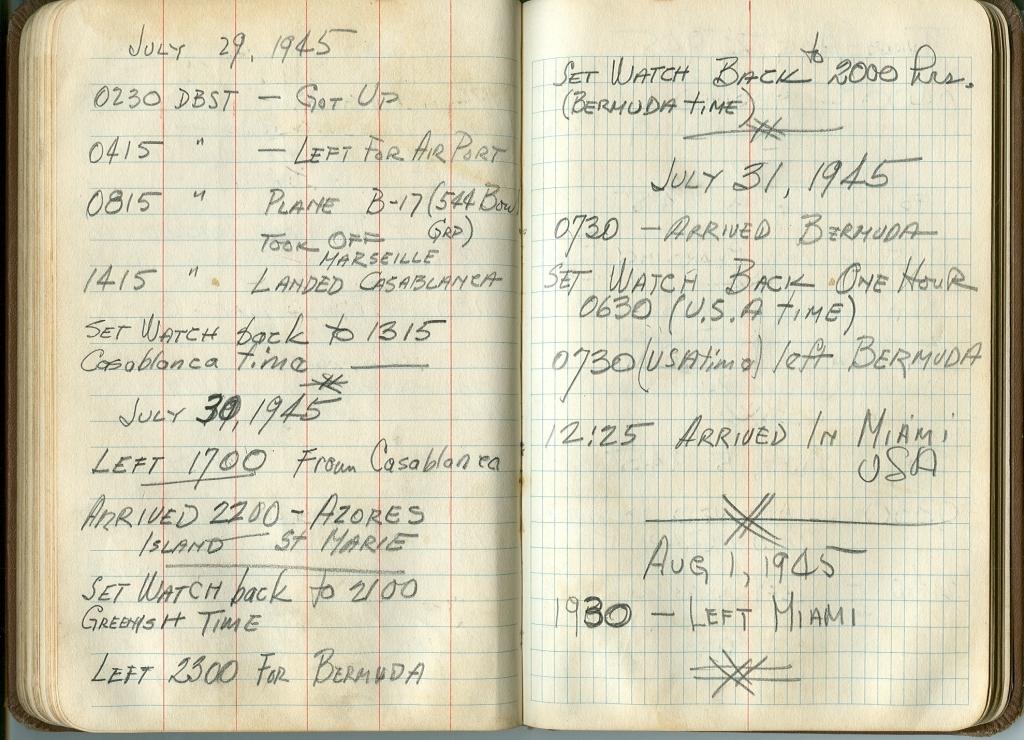
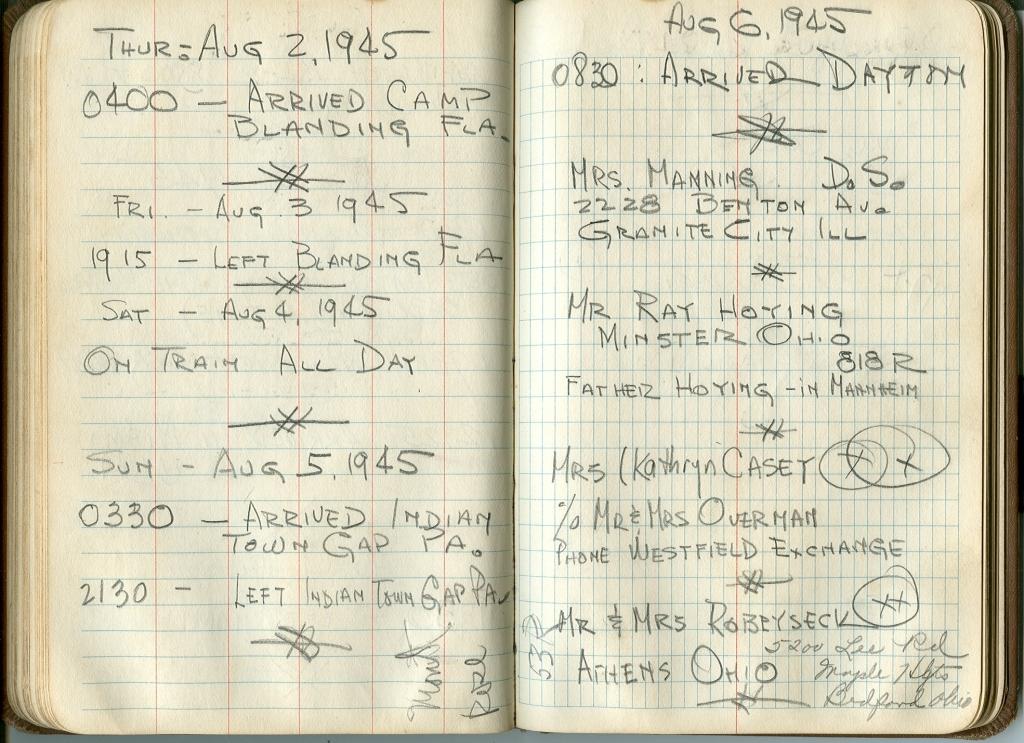
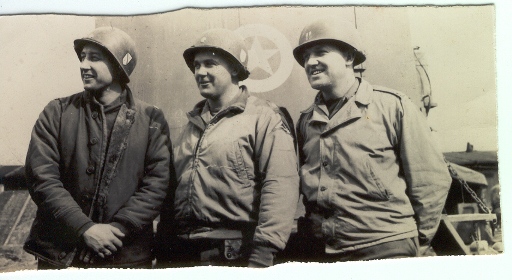
Here his on the left of the picture during the war.
Very cool, Major! Thanks for sharing.
What a fantastic journal! I wish my grandad kept one. Grandma did but it stopped in 1942 shortly after my dad was born.
24th Armored Engineer-- I have my copy of Band of Brothers finally, so I will be sitting down with a big cup of tea and disc one tonight to get stuck into it! Very much looking forward to watching it. I have had just the opposite of luck with the vets I know. None want to talk. I understand they saw horrible things, hard to think on it these days. They will talk about other portions of their life, but the battlefield seems to be off limits. Sadly, my other grandad.. a Navy vet wouldnt really talk about it either. He would pull out a globe and show you everwhere he went, show you the money he kept from various places he had been to, but many questions were just unanswered. He went from the far east, westward toward the end of the war and post war delivering supplies. He saw the aftermath, and that could not have been picturesque.
Thank you for your responses. I will probably have more questions soon... 
My great uncle was in the Navy during WWII and served in the Pacific as well. I am unaware of what ship, as all if have on him is about 5 pictures. He died before I was even born.
Re talking: A friend of mine took his Uncle, a WWII vet, on a fishing trip for that purpose- to talk about the war. He would not talk about it any other time. I am telling you, sit them down and give them your undivided attention. Have a nice, formal conversation about it. They won't talk about it on a whim, it's too hard for them. Another thing I have noticed is they seem not to talk about it as much with family. I'm not sure why. I can only speculate, but it may have something to do with protecting their family from the bad they saw. The other reason is they don't want to tell them how close to death they came, but I think this is less likely.
Ask away, I'm sure someone here can help.
That is a wonderful journal CaptO! When I read things like that, I can feel the excitement as the guys get closer and closer to home!
Brian




